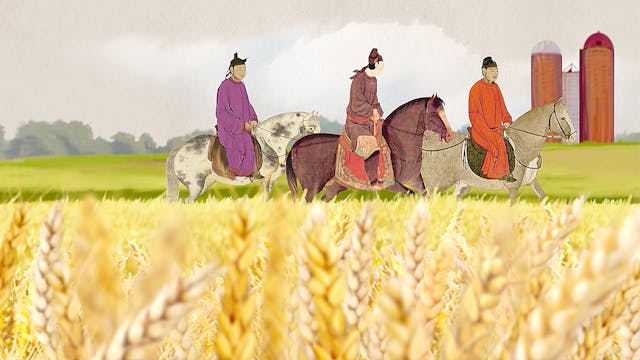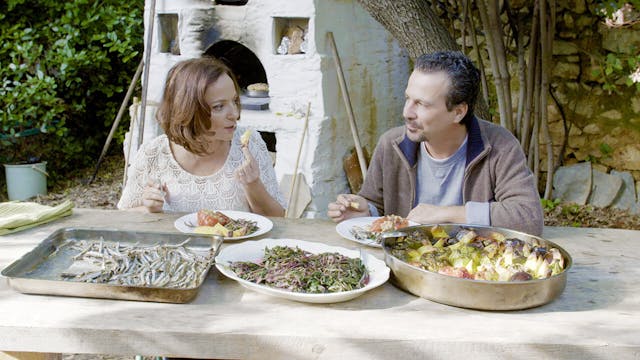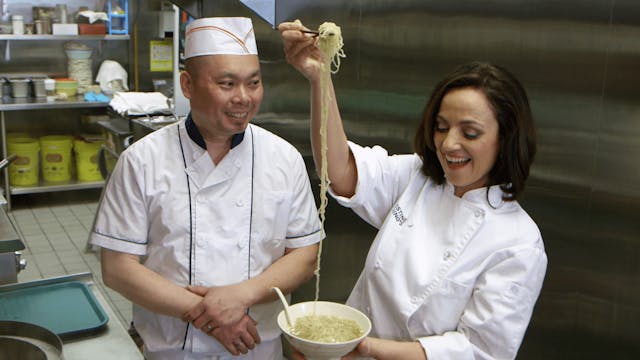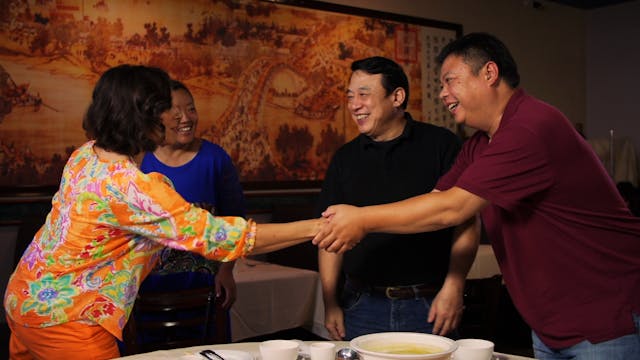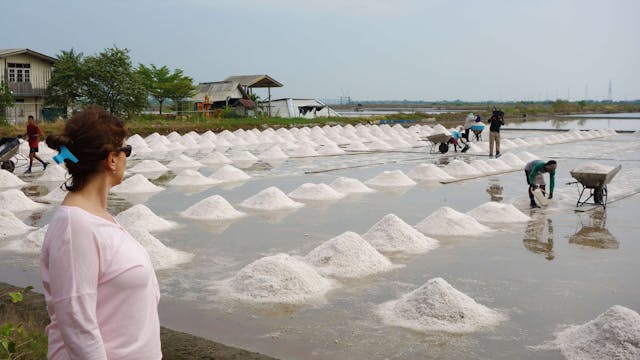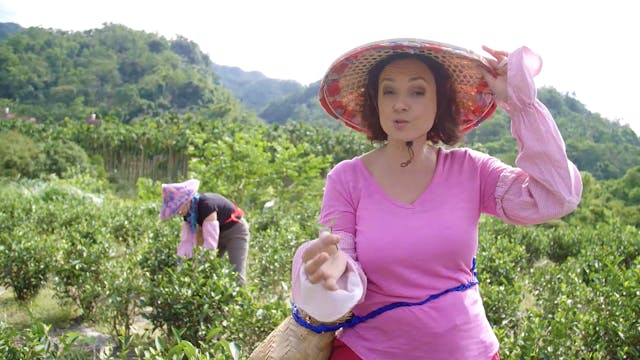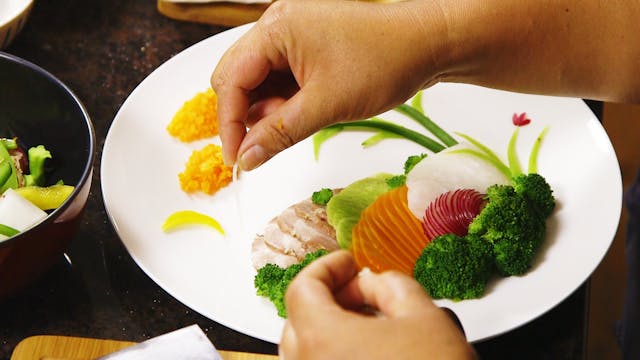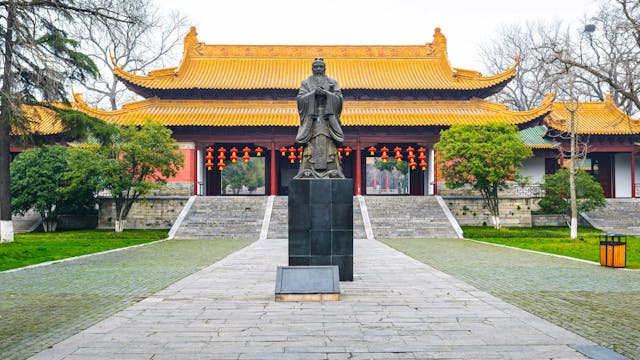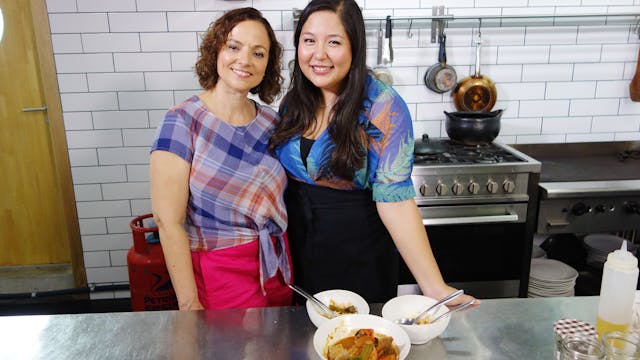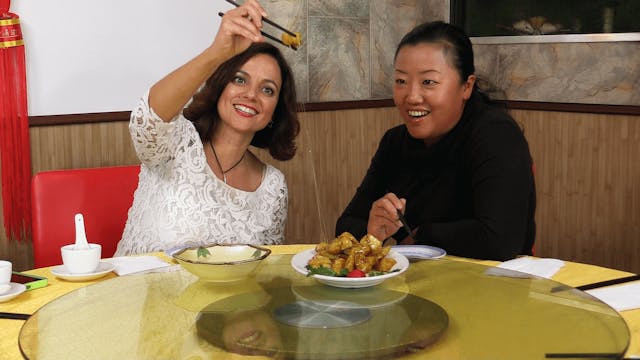Confucius Was a Foodie Season 1 & 2
14 episodes of 'Confucius Was a Foodie' as seen on PBS Stations across America.
-
S1: Ep.1—Origins of the Beginnings
Everything has its origins somewhere. When it comes to food, their roots can often be traced back to China—a culinary and cultural world going back more than 5,000 years. In this episode, Chef Christine looks for the culinary roots of foods such as ice cream, ketchup, pasta, phyllo, baklava and p...
-
S1: Ep.2—Confucius and Food Philosophy
Was it Confucius or Hippocrates who first said, “let food be your medicine and medicine be your food”? Chef Christine sets off to compare the thoughts and beliefs of foodie writers and philosophers.
-
S1: Ep.3—Celebrations, Ceremonies and the Dumpling
Christine eats her way through the Chinese Solar Lunar calendar with traditional customs, cuisine and culture. The calendar appears to have a dumpling for every occasion!
-
S1: Ep.4—Noodles: Long Life, Food of Legends
Birthday parties and baby naming ceremonies all wish for the same thing—a long life. Longevity is symbolized by the noodle in Chinese culinary culture with more kinds of noodles than one can possibly imagine!
-
S1: Ep.5—The Big Picture
Christine walks in the footsteps of some of the first Chinese immigrants in North America, revealing stories of luxurious early Cantonese restaurants and imported Chinese chefs and ingredients. From its popularity in the Jewish communities of New York in the early 1900s to its 1950s resurfacing ...
-
S1: Ep.6—Cantonese
Chef Christine Cushing tastes the worst and the best Cantonese; food that makes her question what she has previously considered ‘Cantonese’. She learns dim sum-making in New York’s oldest parlor, has a Cantonese breakfast in California’s San Gabriel Valley and discovers that real Cantonese is a ...
-
S1: Ep.7—Sichuan
It is said of Sichuan cuisine that 100 dishes will have 100 flavors, so why is it that when North Americans think Sichuan they think hot hot hot? As a unique style of food, Sichuan cuisine was already famous more than 800 years ago during the Southern Song Dynasty. Originally, the cuisine’s fla...
-
S1: Ep.8—Sweet
Chinese cuisines use sugar very differently from Western cuisines, and Christine starts her comparison in Paris and Athens where she looks at how Westerners interpret ‘sweet’. Traditionally, for the Chinese, sugar is predominantly used to achieve balance, but the liberal use of sugars in South E...
-
S2: Ep 1: The Salty Flavor
Most salt in Asia is produced through the evaporation of seawater in coastal areas. This episode sees Christine learning firsthand the very challenging ‘how to’ of harvesting sea salt in Thailand’s dramatically beautiful salt fields. Cushing visits the area’s most unusual market that is regularly...
-
S2: Ep 2: Tea Culture, Celebration & Commerce
The story of tea starts in China, where legend has it that tea was discovered through leaves accidentally falling into boiling water, and continues all the way to the traditional Chinese wedding tea ceremony and the political intrigues of the American Revolution.
Christine brings along celebri... -
S2: 3: Huaiyang - The Cuisine of Poets
Chef Cushing discovers that Huaiyang cuisine is historically connected to poets and scholars, and demands meticulous knife skills and elaborate presentations. The cuisine appears to be a personification of the teachings of Confucius. The creative presentation of skillfully combined ingredients ex...
-
S2: Episode 4: The Origin of ‘Cuisine’
Is Chinese cuisine, with its Confucian structure, really the origin of the world’s great cuisines? Find out in this episode.
-
S2: Episode 5: The Bitter Flavor
The bitter flavor is often found in Chinese cooking, but rarely used alone. It is said to clear "heat", strengthen the stomach, and promote salivation
-
S2: Episode 6: Shandong - The Cuisine of Confucius
The oldest of the Chinese cuisines and with roots in dishes served to royalty, Shandong is known as the cuisine of Confucius.
-
Confucius Foodie Insiders Bonus Recipes
1.15 MB

